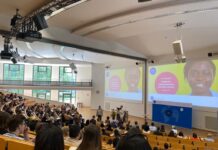
“It has been a year since Gilang shared his experience as a PhD student at The University of Western Australia. In this article, Gilang shares his milestones and his key learning points as a PhD student.“
—
Hi Gilang! It’s been a while! How’s your PhD going?
Hi, Dessy! It is progressive and challenging as you might imagine. In the first three months of this year, I have been busy with my annual progress report completion, literature review and confirmation of candidature. I am glad that I managed to finish my first year PhD study along with all requirements for my confirmation of candidature two months ago and officially got my PhD candidate title!
I also have reported an update on my research progress in front of our research collaborator from France. Right now, I am still optimising some methods for my second-year experiment. It is not easy but I am sure in the end it will be worth the struggle.

I also got a chance to be a laboratory demonstrator in two units this semester (CHEM1001 – Properties and Energetics and CHEM1003 – Introduction to Chemistry). It is great that I can teach and tutor students again after a while. Thankfully I can manage the duty and responsibility as a lab demonstrator while doing the research midst of my PhD study proven by positive feedback given by my students at the end of the semester.

What have you learnt so far? (other than academic context)
Apart from my PhD study, I was enrolled in a professional development program held by the Educational Enhancement Unit (EEU) at The University of Western Australia (UWA) called SPARK for University Learning and Teaching. SPARK itself is an abbreviation for Skills, Pedagogical Approaches, Resources and Knowledge. I just recently finished this program and got lots of insights to advance my learning and teaching skills as a higher education educator.
I also did a short volunteering session last January in UWA Santos Experience to assist the high school students doing a little experiment about “Molecular Madness and Glowing Bacteria”.

Another course that I attended last year is the Mental Health First-Aid training held by Mental Health First Aid (MHFA) Australia. I completed the 10-hour e-Learning component and 2-hour face-to-face session and assessment and got my certification as a Standard Mental Health First Aider for the next three years. I think mental health matters and that is why I am keen to learn more about it, how to deal with it and especially how to help people with mental health issues.

Could you tell us about your PhD application process?
After I graduated from my Master study, I reached out to many professors and/or postdoctorals by sending them email and dropping my CV. Of course, I read their profiles and research interests first. I asked whether they were looking for a PhD student at that time.
Some professors did not reply at all, some said that they did not have a scholarship to offer. I am so glad and grateful that I received information from my colleague during my Master study that his supervisor was looking for a PhD student for an interesting research project. Hence, I approached his supervisor and corresponding via emails. In short, I was invited for an interview.
It took 2 hours and 40 minutes to present my Master research project, her explanation about the research project, Q&A session and short laboratory tour. Thank God, the next day I got an offer through email. And I said yes! I definitely accepted this offer.
Could you give us some tips to build a good relationship with a supervisor?
My tips will be to maintain a good and healthy communication with our supervisors. Respect their expertise, timetable and life (meaning that if it is not urgent, I will avoid contacting them outside the working hours). Update and be open about your research progress and plan. Ask for their advice and feedback without hesitation. Try to be professional yet friendly (smile! ☺ and say hello when passing by) at the same time.
Overall, what is your advice for those that have intentions to apply for a PhD position? (2-5 points)
- Seek opportunities as much as possible. Opportunities are out there around the world. Note: some opportunities only occur once in a lifetime.
- There is no silly question, including asking for a PhD opportunity. Don’t slash your opportunity by being afraid and shy to ask a question! You will never know till you have tried.
- Expand your connections. For those who already have LinkedIn, make the most of it! Reach out as many connections as possible! You will never know who will come and change your life.
- Prepare yourself! Build your profile as impressive as possible! Focus on your strength and skills and use them to enhance your ‘selling point’.
- Last but not least, if you encounter failures, just keep going and never give up! Most importantly, pray and be hopeful!
About Gilang
Gilang Bintang Fajar Suhono was born in Madiun, East Java, Indonesia. He obtained a Bachelor of Science in Biotechnology in 2017 from University of Surabaya (UBAYA). Shortly after that, he pursued his Master study (Master of Agriculture Science – Specialisation Genetics and Breeding) at the University of Western Australia with the scholarship from Indonesia Endowment Fund for Education (LPDP) in 2019. In February 2021, he accepted a PhD position in Biochemistry and Molecular Biology funded by the Australian Research Council (ARC) Linkage Grant in the ARC Centre of Excellence, in Plant Energy Biology at the School of Molecular Sciences, the University of Western Australia under the supervision of Professor Ian Small and Dr. Joanna Melonek.









